

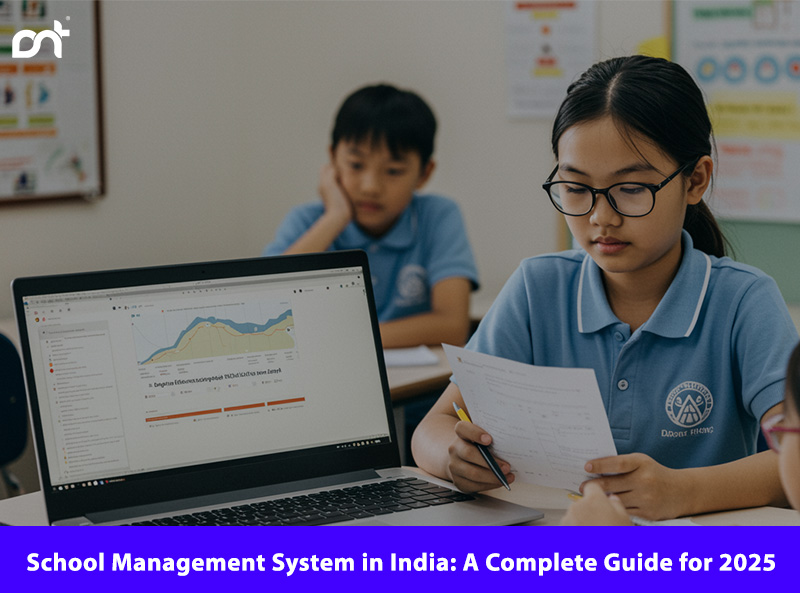
India's education landscape is undergoing a transformative shift, driven by digitization, innovation, and the growing need for operational efficiency in schools. At the heart of this transformation lies the School Management System (SMS) — a centralized digital solution designed to streamline the academic, administrative, and communication processes of educational institutions.
In this blog, we’ll cover everything there is to know about School Management Systems in India — from types and features to challenges, future trends, and why Devant IT Solutions is leading the change with its customized and intelligent software solutions.
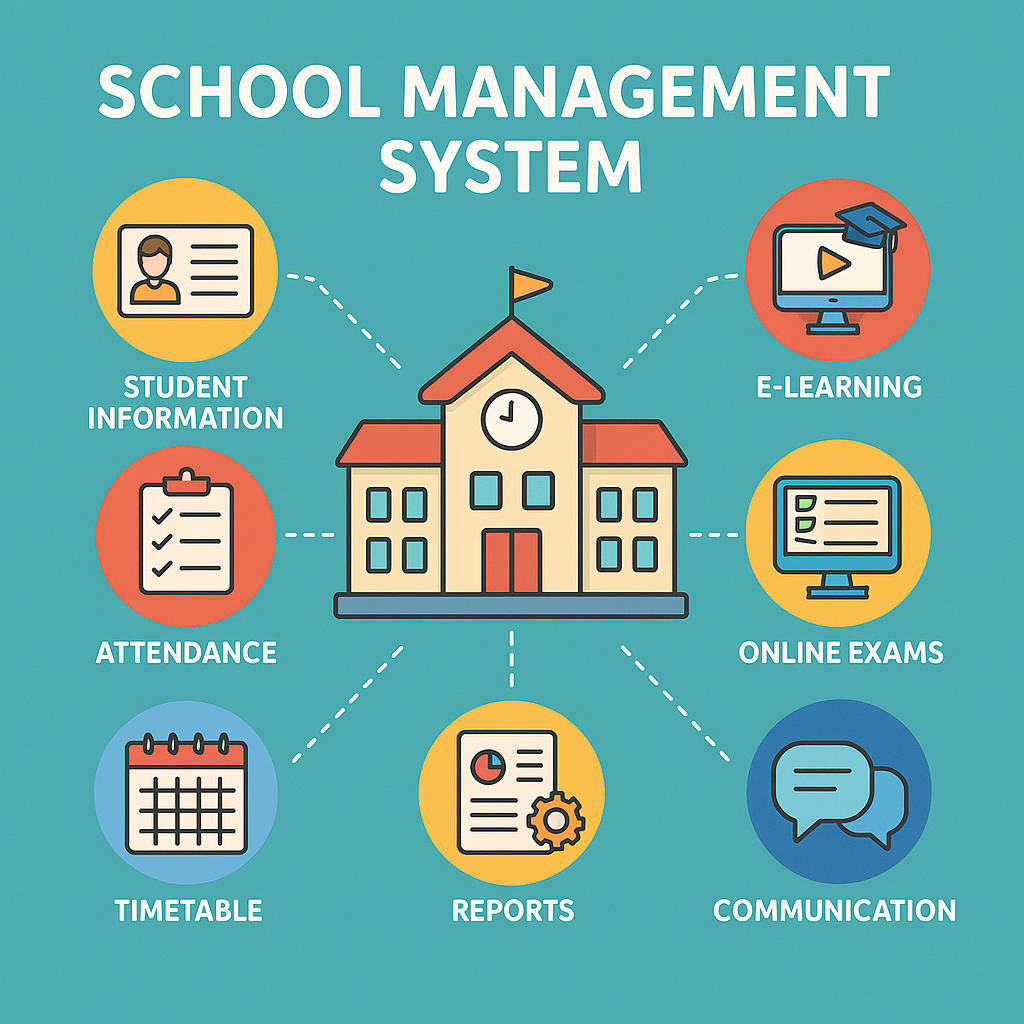
A School Management System is an integrated platform that automates various processes within a school, including admission, attendance, examinations, fees, timetables, teacher and student records, library management, communication, and more.
It acts as a digital nerve center for the school, bringing together teachers, students, administrators, and parents on a single platform.
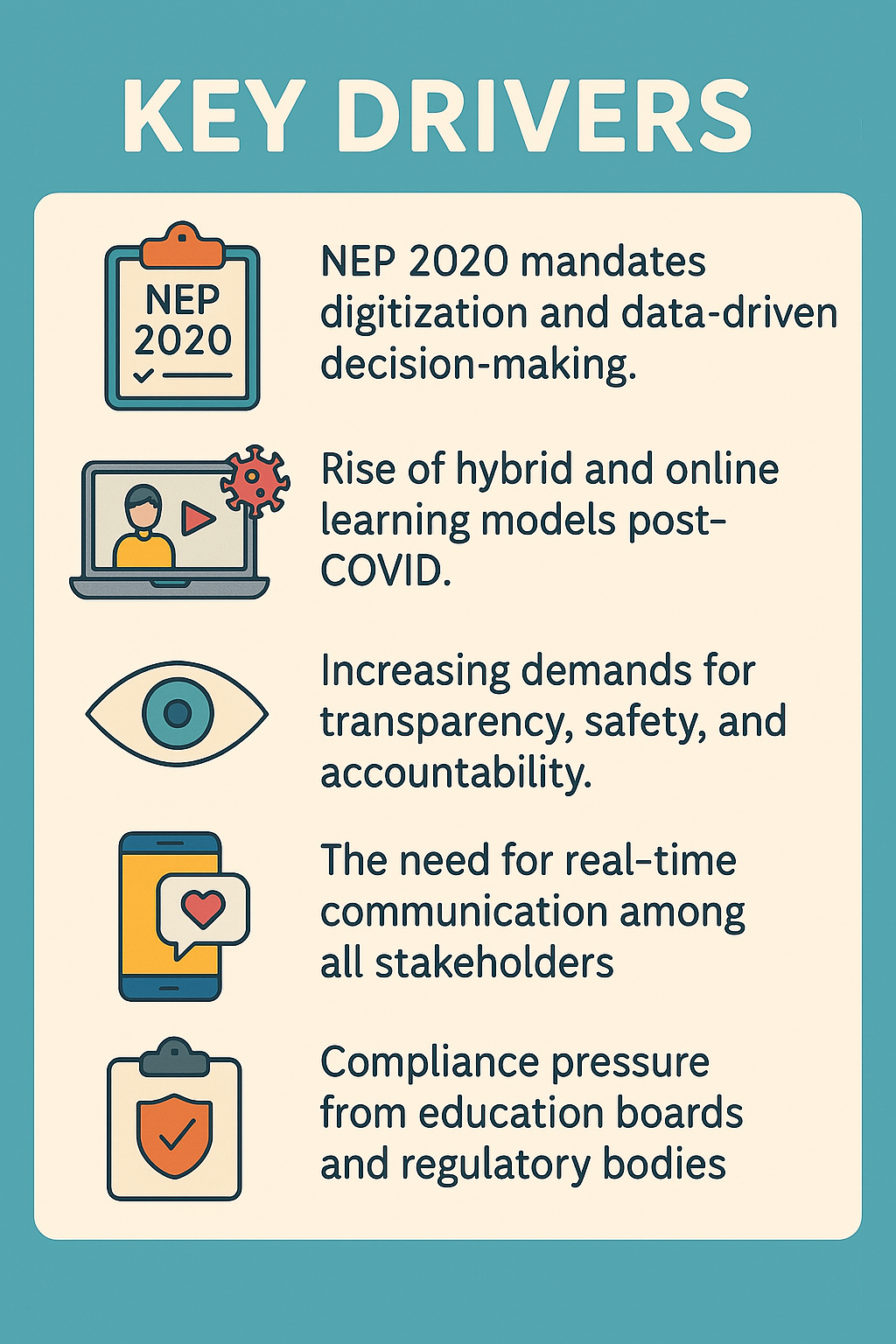
India has over 15 lakh schools, catering to more than 26 crore students and over 1 crore teachers (source: UDISE+ 2023-24). The traditional paper-based system has become obsolete and inadequate in handling this scale and complexity.
NEP 2020 mandates digitization and data-driven decision-making.
Rise of hybrid and online learning models post-COVID.
Increasing demands for transparency, safety, and accountability.
The need for real-time communication among all stakeholders.
Compliance pressure from education boards and regulatory bodies.
A best-in-class SMS like the one offered by Devant IT Solutions comprises modules that touch every function within the school. Here's a breakdown:
Online admission, enrollment & verification
Class allocation and sectioning
ID card generation
Promotion, graduation & alumni management
Custom fee structure by class/course
Automated billing & payment reminders
Online payment gateway integration
Reports, ledgers, and audits
Biometric or RFID-based attendance
Auto SMS to parents for absentees
Timetable generation with clash detection
Online/offline exam scheduling
Mark's entry & grade computation
CBSE/ICSE/State board-compliant report cards
Result analytics and rank generation
App-based circulars and notices
Homework sharing & teacher feedback
Online PTM booking
Two-way parent-teacher chat
Online class scheduling (Zoom, Meet integration)
Notes, assignments, and quizzes
Auto-grading and progress tracking
Teacher recruitment, onboarding & appraisal
Leave & attendance tracking
Salary calculation, payslips & compliance (PF/ESI/TDS)
Barcode/RFID book tracking
Book issuance & return
Asset tracking (lab equipment, furniture, etc.)
GPS tracking of school buses
Route optimization
Driver attendance and vehicle maintenance records
Data encryption & role-based access
Audit logs
Compliance with CBSE IT norms and GDPR
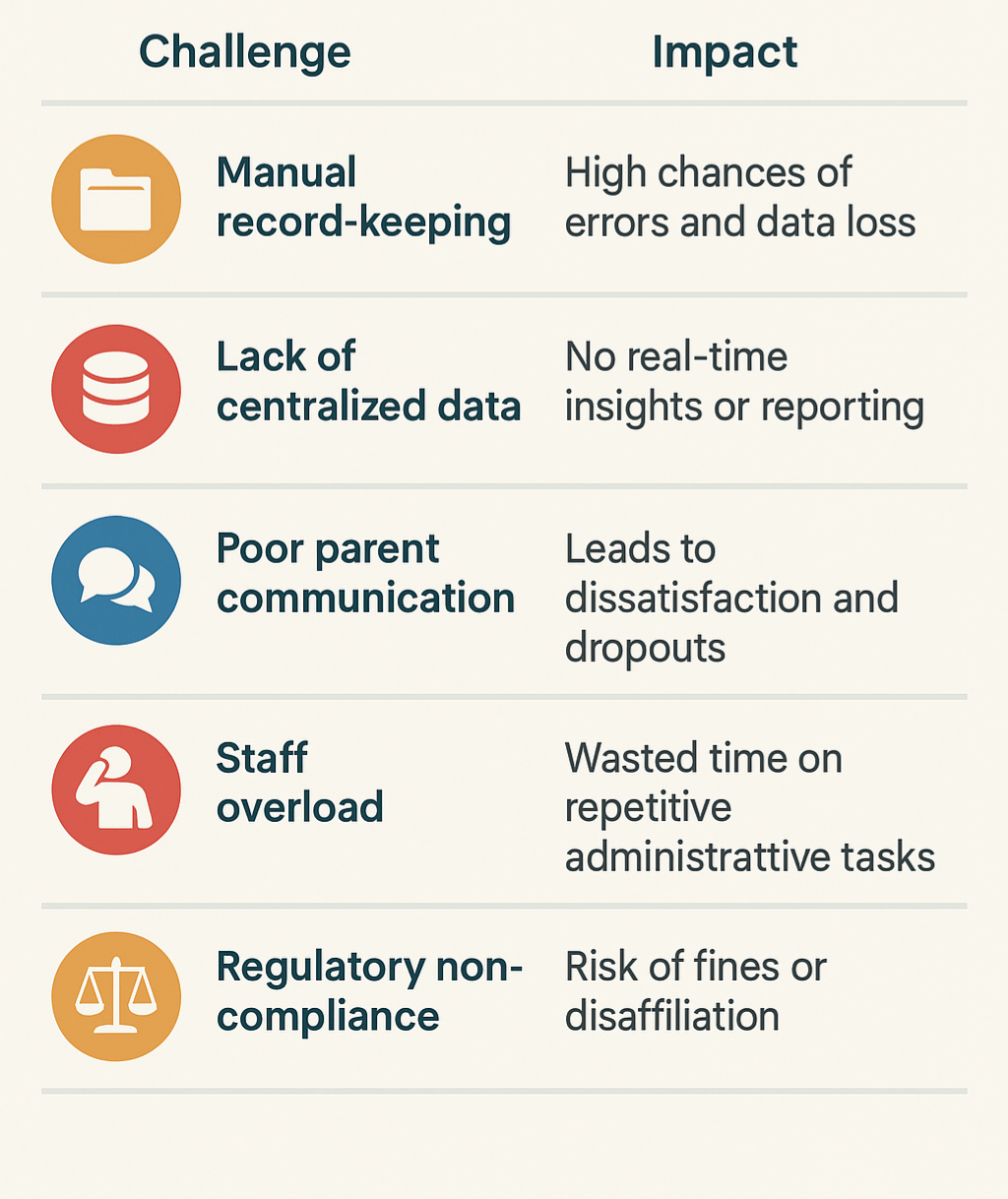
Devant understands that a school in Kolkata functions differently from one in Jaipur or Bengaluru. That’s why Devant’s SMS is completely customizable to fit the cultural, academic, and regulatory nuances of CBSE, ICSE, state boards, and international curricula.
From predictive attendance analytics to student performance forecasting, Devant brings the power of AI into classrooms and school admin panels, enabling data-driven decisions.
Devant’s system is fully mobile-responsive — available as a branded Android/iOS app for schools, keeping parents connected on the go and giving teachers tools at their fingertips.
Whether you need Zoom, Google Meet, Digilocker, Tally, or UMANG integration, Devant ensures zero disruption to your existing ecosystem.
Devant’s solutions are built on end-to-end encryption protocols with multi-factor authentication, ensuring your school data stays private and protected.
Whether you prefer AWS cloud hosting or your own on-site servers, Devant provides scalable deployment models for every budget and infrastructure.
From onboarding and staff training to 24/7 tech support, Devant ensures that your school never feels stuck or underserved.
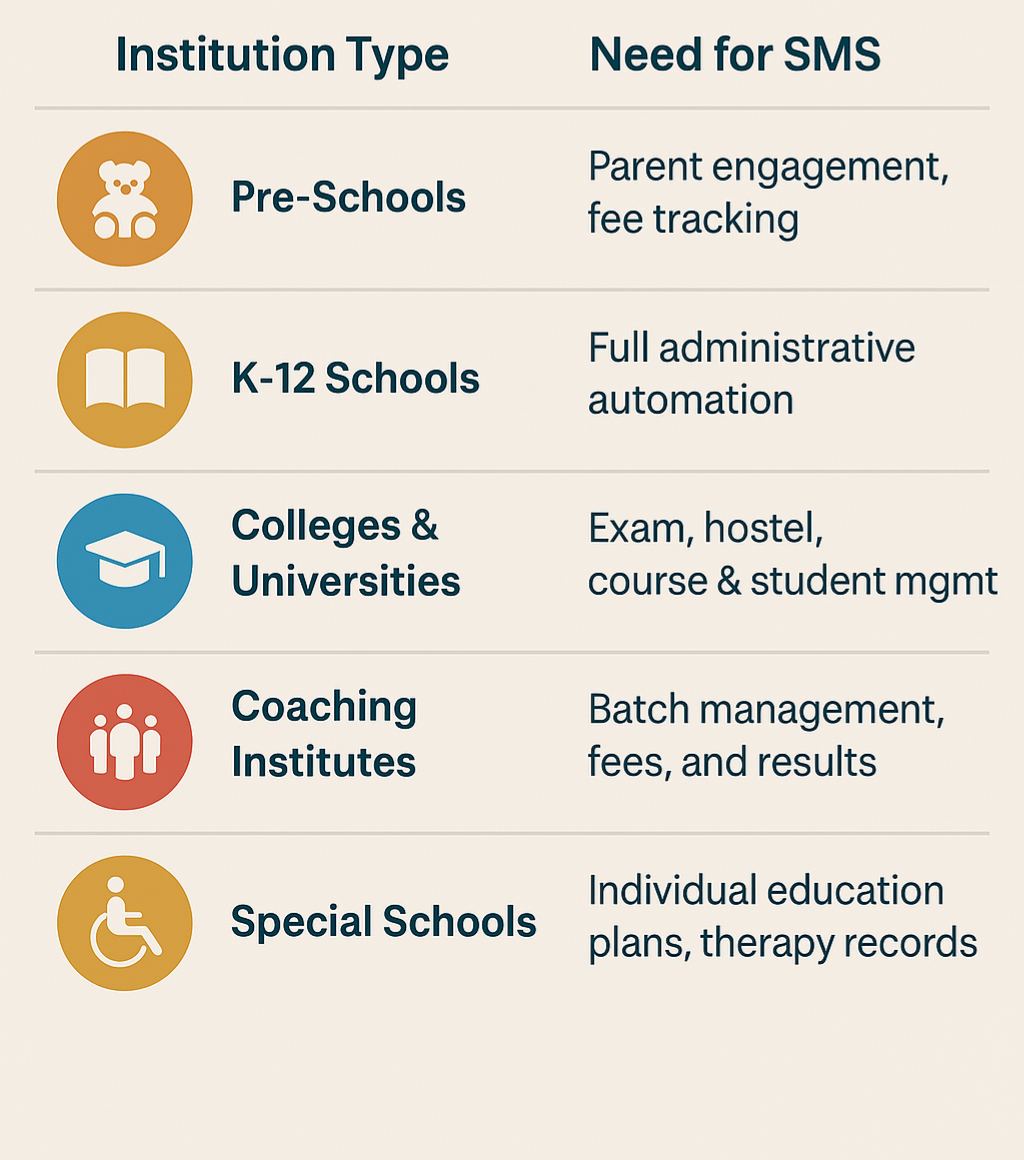
Here’s what’s coming in the next 3–5 years:
AI-based personalized learning paths
Blockchain-enabled student record verification
Voice-activated commands for teachers/admin
IoT integration for real-time campus surveillance
Digital twin models of entire school operations
With these futuristic capabilities, Devant IT Solutions is already investing in R&D to be ahead of the curve, ensuring schools don’t just adopt tech — they lead with it.
A School Management System is not just software — it's a strategic investment in your institution’s future. When choosing a provider, schools must look beyond price and focus on customization, support, innovation, and reliability.
With its India-first approach, modular architecture, and dedicated support, Devant is enabling schools across the country to go digital without losing the human touch.
A School Management System in India is a comprehensive software solution designed to streamline and automate the various administrative and academic tasks within an educational institution. It acts as a central database and a unified platform for all stakeholders, including school administration, teachers, students, and parents. This digital school system in India helps manage everything from admissions and fee collection to academic reporting and parent-teacher communication, thereby reducing manual workload and improving overall efficiency.
While the terms are often used interchangeably, a School ERP (Enterprise Resource Planning) software in India is a more advanced and integrated version of a basic school management system. An ERP system integrates all the different functions of a school into one single system. So, while a basic system might have separate modules for the library and finance, a School ERP software India ensures seamless data flow between them. For instance, a student's library dues could be automatically reflected in their pending fee report. This holistic approach provides a comprehensive view of the school's operations and resources.
Implementing School automation software offers a multitude of benefits for Indian schools:
When selecting the Best school management software in India, it's crucial to look for a comprehensive set of features that cater to the specific needs of your institution. Key modules to consider include:
An Education management system in India is a broad term that encompasses a wide range of software and tools used to manage educational institutions. A School Management System in India is a specific type of education management system tailored for K-12 schools. The overarching goal of any Education management system in India is to leverage technology to improve the quality of education and the efficiency of institutional management.
Opting for an Indian school software solution offers several advantages. These solutions are specifically designed to cater to the unique requirements of the Indian education system, including compliance with various educational boards (CBSE, ICSE, State Boards), and management of diverse fee structures and examination patterns. Local providers also offer better on-ground support and understanding of the regional challenges.
A Digital school system in India goes beyond just administrative tasks. It can significantly enhance the learning experience by:
Companies like Devant IT Solutions' school ERP are key players in the development and implementation of robust and customized school management software. They offer comprehensive School ERP software solutions that are designed to meet the specific needs of educational institutions. Their expertise lies in providing end-to-end solutions, from initial consultation and system deployment to ongoing technical support and training. Choosing a reputable provider like Devant IT Solutions' school ERP ensures that your institution gets a reliable and effective system that can scale with your future needs.
Data security is paramount, and a modern School Management System in India is designed with multi-layered security protocols to comply with regulations like the DPDP Act. Key features include:
The Best school management software in India is evolving to become a critical tool for implementing NEP 2020. It goes beyond administrative tasks to support pedagogical changes by:
Choosing between a cloud and an on-premise solution is a critical decision. Here’s a breakdown:
For most schools in India, a cloud-based Digital school system offers the best balance of features, affordability, and low maintenance.
The ROI from School automation software extends far beyond material savings. Key areas of return include:
While the benefits are significant, implementation can have challenges. The biggest ones are often human, not technical:
An advanced Education management system in India now integrates AI and analytics to move from being just a system of record to a system of intelligence. Providers like Devant IT Solutions' school ERP are incorporating:
Contact Devant IT Solutions today for a free demo and consultation. Let’s build a smarter, more connected, and efficient education system together.
👉 Website: www.devantitsolutions.com
👉 Email: info@devantitsolutions.com
👉 Phone: +91-7596032267